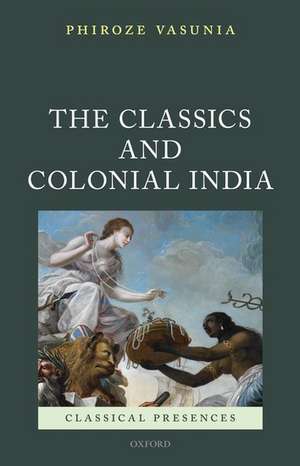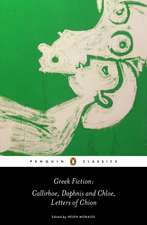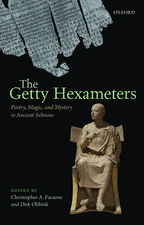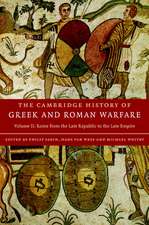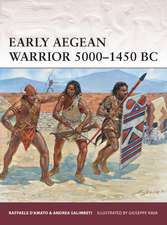The Classics and Colonial India: Classical Presences
Autor Phiroze Vasuniaen Limba Engleză Hardback – 15 mai 2013
Din seria Classical Presences
- 28%
 Preț: 473.71 lei
Preț: 473.71 lei - 30%
 Preț: 493.26 lei
Preț: 493.26 lei - 30%
 Preț: 501.15 lei
Preț: 501.15 lei - 27%
 Preț: 476.23 lei
Preț: 476.23 lei - 6%
 Preț: 337.35 lei
Preț: 337.35 lei - 30%
 Preț: 540.38 lei
Preț: 540.38 lei - 28%
 Preț: 474.92 lei
Preț: 474.92 lei - 30%
 Preț: 501.92 lei
Preț: 501.92 lei - 13%
 Preț: 226.46 lei
Preț: 226.46 lei - 25%
 Preț: 687.80 lei
Preț: 687.80 lei - 30%
 Preț: 582.93 lei
Preț: 582.93 lei - 30%
 Preț: 821.25 lei
Preț: 821.25 lei - 26%
 Preț: 614.24 lei
Preț: 614.24 lei - 19%
 Preț: 677.96 lei
Preț: 677.96 lei - 18%
 Preț: 704.79 lei
Preț: 704.79 lei - 30%
 Preț: 538.77 lei
Preț: 538.77 lei - 30%
 Preț: 645.95 lei
Preț: 645.95 lei - 30%
 Preț: 501.52 lei
Preț: 501.52 lei - 30%
 Preț: 617.54 lei
Preț: 617.54 lei - 27%
 Preț: 519.88 lei
Preț: 519.88 lei - 16%
 Preț: 706.89 lei
Preț: 706.89 lei - 25%
 Preț: 554.32 lei
Preț: 554.32 lei - 16%
 Preț: 584.68 lei
Preț: 584.68 lei - 30%
 Preț: 562.14 lei
Preț: 562.14 lei - 30%
 Preț: 598.80 lei
Preț: 598.80 lei - 25%
 Preț: 612.31 lei
Preț: 612.31 lei - 30%
 Preț: 589.73 lei
Preț: 589.73 lei - 30%
 Preț: 789.84 lei
Preț: 789.84 lei - 30%
 Preț: 600.20 lei
Preț: 600.20 lei - 30%
 Preț: 611.82 lei
Preț: 611.82 lei - 29%
 Preț: 1083.87 lei
Preț: 1083.87 lei - 30%
 Preț: 720.23 lei
Preț: 720.23 lei - 19%
 Preț: 326.97 lei
Preț: 326.97 lei - 30%
 Preț: 760.17 lei
Preț: 760.17 lei - 30%
 Preț: 833.88 lei
Preț: 833.88 lei -
 Preț: 307.88 lei
Preț: 307.88 lei - 28%
 Preț: 446.91 lei
Preț: 446.91 lei - 30%
 Preț: 721.88 lei
Preț: 721.88 lei - 30%
 Preț: 575.88 lei
Preț: 575.88 lei - 30%
 Preț: 598.02 lei
Preț: 598.02 lei - 30%
 Preț: 803.03 lei
Preț: 803.03 lei - 30%
 Preț: 733.67 lei
Preț: 733.67 lei - 30%
 Preț: 701.54 lei
Preț: 701.54 lei - 30%
 Preț: 601.52 lei
Preț: 601.52 lei - 30%
 Preț: 747.48 lei
Preț: 747.48 lei - 30%
 Preț: 556.05 lei
Preț: 556.05 lei - 30%
 Preț: 818.03 lei
Preț: 818.03 lei - 30%
 Preț: 716.96 lei
Preț: 716.96 lei
Preț: 663.43 lei
Preț vechi: 947.19 lei
-30% Nou
Puncte Express: 995
Preț estimativ în valută:
126.95€ • 132.88$ • 105.66£
126.95€ • 132.88$ • 105.66£
Carte tipărită la comandă
Livrare economică 19-25 martie
Preluare comenzi: 021 569.72.76
Specificații
ISBN-13: 9780199203239
ISBN-10: 0199203237
Pagini: 414
Ilustrații: 11 in-text illustrations and 4 colour plates
Dimensiuni: 162 x 241 x 28 mm
Greutate: 0.89 kg
Editura: OUP OXFORD
Colecția OUP Oxford
Seria Classical Presences
Locul publicării:Oxford, United Kingdom
ISBN-10: 0199203237
Pagini: 414
Ilustrații: 11 in-text illustrations and 4 colour plates
Dimensiuni: 162 x 241 x 28 mm
Greutate: 0.89 kg
Editura: OUP OXFORD
Colecția OUP Oxford
Seria Classical Presences
Locul publicării:Oxford, United Kingdom
Recenzii
This is a gold-mine of a book, that treats a fascinating subject with all the intelligent imagination, based on exhaustive research, that it so richly deserves.
This is a book which significantly deepens our understanding of how classics could exert an influence in a colonial context ... All in all, and most importantly, while this book answers many important questions, it also provides a wealth of evidence to support future research into the nature of the relationship between the classics and empire. It is of undoubted value to scholars specializing in the field of classical reception, classical studies more broadly, and wider audiences interested in the history of classical scholarship and modern intellectual history in a colonial context.
This is a book which significantly deepens our understanding of how classics could exert an influence in a colonial context ... All in all, and most importantly, while this book answers many important questions, it also provides a wealth of evidence to support future research into the nature of the relationship between the classics and empire. It is of undoubted value to scholars specializing in the field of classical reception, classical studies more broadly, and wider audiences interested in the history of classical scholarship and modern intellectual history in a colonial context.
